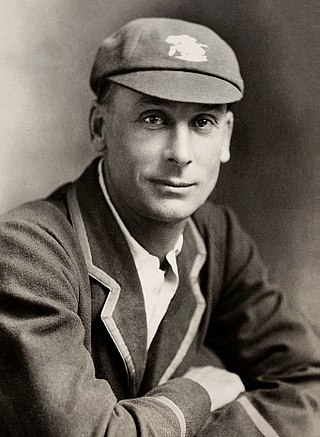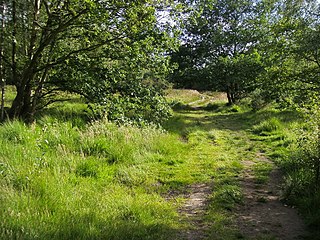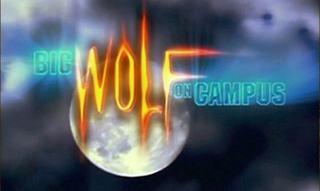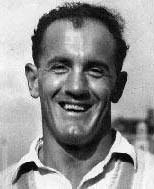
Alan Alexander Milne was an English writer best known for his books about the teddy bear Winnie-the-Pooh, as well as for children's poetry. Milne was primarily a playwright before the huge success of Winnie-the-Pooh overshadowed all his previous work. Milne served in both world wars, as a lieutenant in the Royal Warwickshire Regiment in the First World War and as a captain in the Home Guard in the Second World War.

Sir John Berry Hobbs was an English professional cricketer who played for Surrey from 1905 to 1934 and for England in 61 Test matches between 1908 and 1930. Known as "The Master", he is widely regarded as one of the greatest batsmen in the history of cricket. He is the leading run-scorer and century-maker in first-class cricket, with 61,760 runs and 199 centuries. A right-handed batsman and an occasional right-arm medium pace bowler, Hobbs also excelled as a fielder, particularly in the position of cover point. Hobbs was named as one of the five Wisden Cricketers of the Century alongside Sir Donald Bradman, Sir Garfield Sobers, Shane Warne, and Sir Viv Richards.

Keith Castellain Douglas was a poet and soldier noted for his war poetry during the Second World War and his wry memoir of the Western Desert campaign, Alamein to Zem Zem. He was killed in action during the invasion of Normandy.

Leslie Thomas John Arlott, was an English journalist, author and cricket commentator for the BBC's Test Match Special. He was also a poet and wine connoisseur. With his poetic phraseology, he became a cricket commentator noted for his "wonderful gift for evoking cricketing moments" by the BBC.

Wimbledon Common is a large open space in Wimbledon, southwest London. There are three named areas: Wimbledon Common, Putney Heath, and Putney Lower Common, which together are managed under the name Wimbledon and Putney Commons totalling 460 hectares. Putney Lower Common is set apart from the rest of the Common by a minimum of 1 mile of the built-up western end of Putney.

Sydney Francis Barnes was an English professional cricketer who is regarded as one of the greatest bowlers of all time. He was right-handed and bowled at a pace that varied from medium to fast-medium with the ability to make the ball both swing and break from off or leg. In Test cricket, Barnes played for England in 27 matches from 1901 to 1914, taking 189 wickets at 16.43, one of the lowest Test bowling averages ever achieved. In 1911–12, he helped England to win the Ashes when he took 34 wickets in the series against Australia. In 1913–14, his final Test series, he took a world record 49 wickets in a Test series, against South Africa.

Big Wolf on Campus is a Canadian television series created by Peter A. Knight and Christopher Briggs that ran from 1999 to 2002. The central plot revolves around a teenage boy named Thomas "Tommy" P. Dawkins, who was bitten by a werewolf during a camping trip in the woods a week before his senior year of high school. After the bite transforms him into a werewolf, he fights against vampires, werecats, ghosts, zombies, and other supernatural entities to keep his hometown of Pleasantville safe - even though almost everyone in Pleasantville believes that their protector, dubbed the "Pleasantville Werewolf", is dangerous.
Cricket, though one of the most popular sports in the world, has not seen the popularity that other sports have seen in the film and television industry. There are very few cricket themed movies and mini-series.
Frances Ruffelle is an English musical theatre actress and singer. She won a Tony Award in 1987, and represented the United Kingdom in the 1994 Eurovision Song Contest with the song "Lonely Symphony ", finishing 10th. The song became a UK Top 30 hit.

Alison Steadman is an English actress. She received the 1991 National Society of Film Critics Award for Best Actress for the Mike Leigh film Life Is Sweet and the 1993 Olivier Award for Best Actress for her role as Mari in the original production of The Rise and Fall of Little Voice. In a 2007 Channel 4 poll, the ‘50 Greatest Actors’ voted for by other actors, she was ranked 42.

The New Wimbledon Theatre is situated on the Broadway, Wimbledon, London, in the London Borough of Merton. It is a Grade II listed Edwardian theatre built by the theatre lover and entrepreneur, J. B. Mulholland, who at the time was also owner of the King's Theatre in Hammersmith and had owned the Theatre Metropole in Camberwell in the 1890's. Built on the site of a large house with spacious grounds, the theatre was designed by Cecil Aubrey Massey and Roy Young. It seems to have been the only British theatre to have included a Victorian-style Turkish bath in the basement. The theatre opened on 26 December 1910 with the pantomime Jack and Jill.

Dennis Raoul Whitehall Silk was an English first-class cricketer and a public school headmaster. He was a close friend of the poet Siegfried Sassoon, of whom he spoke and wrote extensively. In the 1990s he chaired the Test and County Cricket Board.
Dominic Anthony Holland is an English comedian, author, actor and broadcaster. He won the 1993 Perrier Best Newcomer Award in Edinburgh. His BBC Radio 4 series, The Small World of Dominic Holland, won a Comic Heritage Award.
Abigail Lucy Cruttenden is an English actress. After beginning her career as a child, she went on to play opposite Sean Bean as his character Richard Sharpe's wife Jane in several episodes of the TV series Sharpe. She has since become known for her roles in sitcoms, which include Kate Weedon in the ITV comedy series Benidorm (2007–2009), and Anna in the BBC sitcom Not Going Out (2014–present).

Robert Urquhart was a Scottish character actor who worked on the stage, for British television, and in film. His breakthrough role was Paul Krempe in The Curse of Frankenstein in 1957, along with Peter Cushing and Christopher Lee.

Another Country is a 1984 British romantic historical drama written by Julian Mitchell, adapted from his play of the same name. Directed by Marek Kanievska, the film stars Rupert Everett and Colin Firth in his feature film debut.

Estcourt High School is a school in Estcourt, South Africa that traces its origins to the Estcourt Government School which was founded in 1886. The high school itself was founded in 1924 when the government school was split into a high school and a junior school.
Alan William Harrington Rayment was an English first-class cricketer and social worker. Rayment played first-class cricket for Hampshire from 1949 to 1958, scoring over 6,000 runs in 198 matches. After retiring from playing, he held a number of occupations, most notably as a senior social worker for West Sussex County Council. From March 2020 to his death in October 2020, he was Hampshire's oldest surviving cricketer.

The Secret Diaries of Miss Anne Lister is a 2010 British biographical historical drama film about 19th-century Yorkshire landowner Anne Lister. Made for television, the film was directed by James Kent and starred Maxine Peake as Lister. The script by Jane English drew from Lister's diaries, written in code, and decoded many years after her death. The story follows Lister's lesbian relationships and her independent lifestyle as an industrialist. The Secret Diaries of Miss Anne Lister held its world premiere screening at the London Lesbian and Gay Film Festival in March 2010 and was broadcast in the United Kingdom by the BBC in May 2010.














